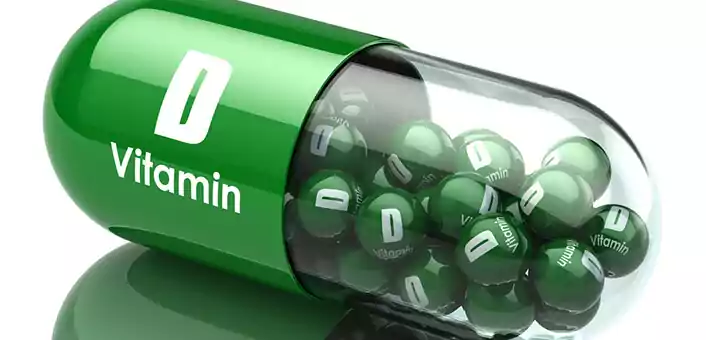PCOS test is based on the Rotterdam criteria for diagnosing PCOS.

Acid Reflux
Vitamin D, also known as the “sunshine vitamin,” is a vital nutrient in many biochemical reactions in the body. It also helps in the absorption of other minerals like calcium, phosphate, magnesium and zinc. New research has shed light on many, hitherto unknown, targets for vitamin D action. Amongst them are cells in the digestive system, highlighting the role of vitamin D in digestion, and thereby providing relief from GERD.
To understand the role of vitamin D in the development of GERD, let’s understand the role of muscle health in acid reflux. The esophagus ends in the stomach via a junction that is guarded by a muscular valve known as lower esophageal sphincter (LES). A functioning LES opens inside the stomach allowing food to pass into the stomach. However, an improper relaxation of the LES leads to its opening the wrong way, spilling acidic contents of the stomach into the esophagus causing heartburn. LES may open the wrong way due to many reasons, including a buildup of high pressure inside the stomach. LES may also malfunction due to the weakening of its muscles.
In a 2008 study, Dr. Walter Stumpf, M.D., Ph. D., who had studied Vitamin D for several decades, outlines the impact of vitamin D receptors on many cells in the digestive system, including the esophagus, stomach and the pyloric sphincter. It is common knowledge that Vitamin D is vital for the proper functioning of muscle cells. This means a deficiency of vitamin D in the body can impair muscle cell functioning, including the functioning of the LES as well as the pyloric sphincter, which guards the lower end of the stomach that opens into the small intestines. If the pyloric sphincter is weak, material from the small intestines will move back into the stomach. This semi-digested material will then be fermented by bacteria causing gas formation, thus putting pressure on an already weakened LES. As a result, the LES opens backwards to allow acidic contents to reflux, causing heartburn.
Low vitamin D levels also impair absorption of magnesium and calcium, among other minerals. Calcium is an important mineral that helps in muscle contraction. Low calcium levels impair proper muscle functioning. Magnesium is another mineral whose abundant levels help keep the digestive system functioning at its optimum. Magnesium also helps the pyloric sphincter relax leading to emptying of the stomach. If the pyloric sphincter remains tightly shut (in case of magnesium deficiency, for example), food remains in the stomach for a longer period, leading to its fermentation. Fermentation leads to gas formation. This excess gas exerts undue pressure on the LES, which can be another contributing factor to the LES opening the wrong way.
Vitamin D acts on muscle cells via an extremely complex process. It regulates calcium transportation inside the cell. Calcium plays a vital role in the actual contraction of muscle fibers. By regulating calcium uptake by muscle cells, vitamin D indirectly regulates muscle function.
The easiest way to get enough vitamin D is from sunlight. Sunlight promotes the synthesis of vitamin D from cholesterol in the body. Apart from it, vitamin D can also be found from certain foods. Dietary sources of vitamin D are:
The recommended daily requirement of vitamin D for a healthy individual is 600 IU. However, in a scenario wherein almost half of the adult US population is vitamin D deficient, it is necessary to first restore the vitamin’s levels back to adequate. This should be done by vitamin D supplementation. A per week dosage of 60,000 IU of vitamin D (a single dosage once a week) is recommended for around 3 months. After three months, it is advisable to get your vitamin D3 levels checked. If they are adequate, you can continue either taking a lower dosed vitamin D supplement (like a multivitamin) or eat foods rich in vitamin D to get adequate amounts of the vitamin.
Dosages as high as 60,000 IU for 3 months are safe. Even dosages of around 4000 IU per day are safe. Higher dosages, however, may prove to be unsafe and lead to health complications. Vitamin D supplementation should not be taken (or should be taken under strict medical guidance) if you are suffering from kidney disease, atherosclerosis, sarcoidosis, histoplasmosis, hyperparathyroidism, lymphoma and tuberculosis.
Sufficient amounts of Vitamin D are required for normal bodily functions. This vital nutrient supports biochemical functioning through an extremely complicated manner, assisting many other nutrients to do their jobs properly. The discovery of vitamin D receptors in the gastrointestinal tract has opened up a whole new avenue of insights in its role in digestive health. Therefore, correcting vitamin D deficiency is a safe way of addressing the burning problem of GERD.
Our Choice of Vitamin D available on Amazon:
Vitamin D and the digestive system
https://www.unc.edu/~stumpfwe/bio/Vitamin%20D%20and%20the%20Digestive%20System.pdf